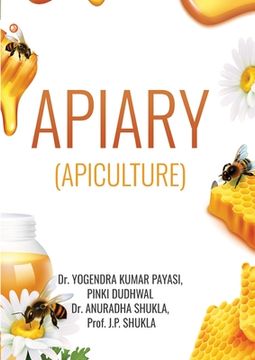Share
Apiary (in English)
Yogendra Kumar Payasi
(Author)
·
Orangebooks Publication
· Paperback
Apiary (in English) - Payasi, Yogendra Kumar
$ 8.69
$ 10.86
You save: $ 2.17
Choose the list to add your product or create one New List
✓ Product added successfully to the Wishlist.
Go to My WishlistsIt will be shipped from our warehouse between
Wednesday, June 26 and
Thursday, June 27.
You will receive it anywhere in United States between 1 and 3 business days after shipment.
Synopsis "Apiary (in English)"
First known usage of the word "apiary" was in 1654. The base of the word comes from the Latin word "apis" meaning "bee", leading to "apiarium" or "bee house" and eventually "apiary". Bee keepers rarely be referred to as "apiarist" or "ones who tend apiaries". The basic difference between apiary and hive is that, hive is a structure for housing a swarm of honey bees while apiary is a place where bees and their hives are kept. Lack of a comprehensive treatise on Biology of honey bees and their products has prompted this humble piece of work leading to Apiculture. This is an ideal text book of Apiculture which will serve as valuable work for undergraduate and post graduate students looking for a comprehensive source on a wide variety of topics namely "Basics of Apiculture; Bee hive and methods of bee keeping; Modern methods of Apiculture; Diseases of honey bee and control measures; Bee enemies; Honey bees for cross pollination in horticulture gardens; Products of bee keeping and their extraction. Also social behaviour, communication and swarming behaviour has been illustrated in the present book.In view of Albert Einstein, if the bees disappear, humanity cannot survive more than four years. If we have the bees, then we save our planet. If there is no bees, there is no food because about 75% of the agriculture is pollinated by the honey bees. In this context, no Apiculture if there is no Agriculture and no Agriculture if there is no Agriculture. Keeping this fact, present book has been authored and hope that the students of the UG and PG will be benefitted in light of the courses established in New Education Policy of India. Various problems related with bee keeping may be solved by studying this book.
- 0% (0)
- 0% (0)
- 0% (0)
- 0% (0)
- 0% (0)
All books in our catalog are Original.
The book is written in English.
The binding of this edition is Paperback.
✓ Producto agregado correctamente al carro, Ir a Pagar.

